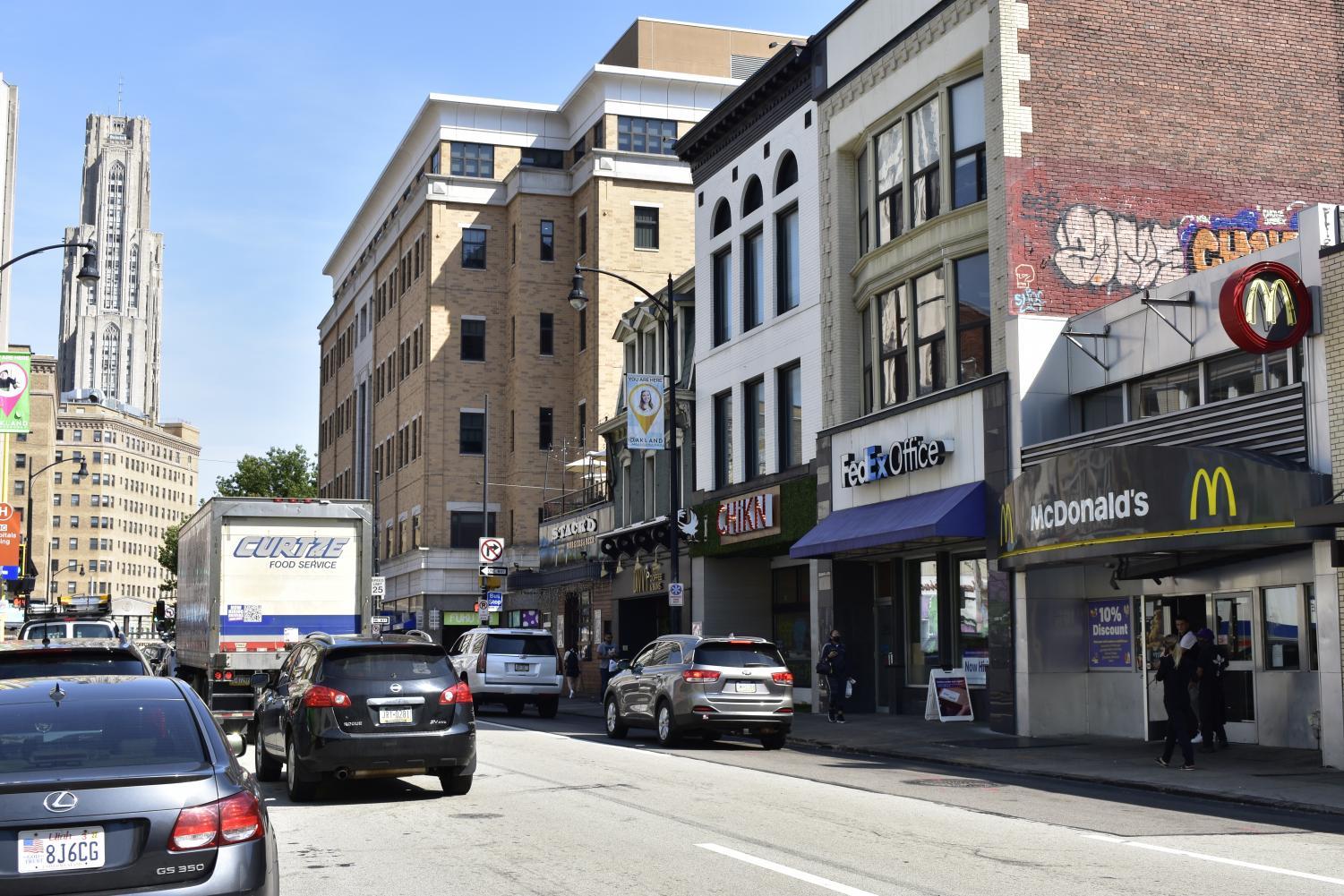Opinion | Men, stop taking up the entire sidewalk


The sidewalk on Forbes Avenue in Oakland.
Before I get into how male entitlement directs ordinary encounters, I’m not offering the excuse of “not all men.” If you’re reading this and feeling insulted, the chances are astronomically high that this applies to you. Instead of getting offended, take a step back and reevaluate — you’re making life harder for everyone around you when you take up the space you think you deserve. That being said, let’s begin.
On the Oct. 5 episode of Glennon Doyle’s podcast “We Can Do Hard Things,” she talks about bravery. Doyle’s bravery came in the form of holding her ground in one of the most intimidating public interactions — maintaining a singular person’s amount of space while walking on the sidewalk, despite a man barreling toward her with seemingly no intention of reverting to the natural walking flow. This isn’t the United Kingdom — walk on the right hand side. Space was not made for her, and as a result she was left with a bruised shoulder and sense of confidence.
It is important to determine where space isn’t held for you, because it provides critical recognition of how you are viewed in those spaces. Whether on the street or in my academic life, space is not always reserved for me — I often need to create it on my own. The same can be said for other aspects of life, like why a gender wage gap still exists in 2021, why women and gender non-conforming people’s medical symptoms are taken less seriously than their male counterparts or why men are viewed as having higher intelligence. These are the effects of male entitlement. It’s not simply the space on the sidewalk — it’s about the space in public, professional and intimate realms. The world loves a strong man but resents a bold woman.
After listening to the podcast, a new kind of awareness and acknowledgement sparked inside of me. I began observing the same phenomenon in my own life that Doyle saw. I wanted to be as bold as her and, sure enough, the opportunity soon presented itself. Within the span of a few days I was almost driven into a mailbox and poster board while walking — not because the space on the sidewalk didn’t exist, but because I’m apparently not entitled to it.
A couple weeks ago, two men on the sidewalk watched me walk toward them. Once they acknowledged my presence, they almost immediately determined that I’m unworthy of the public space designated for every body. Their reaction, or should I say lack thereof, implied that I should advance toward the grass strip beside the pavement, since their positions remained unchanged. The few inches between their bodies and the mailbox — all the space available — only allowed enough room for a small dog to pass. I am not a chihuahua. Instead I tried to silently demand the space I am owed and, like Doyle, I found this intimidating.
Why do I need to shrink to be accepted? The daggers in their eyes questioned my authority. I acted as though this response would stain my reputation, asserting me as the worst kind of rebel — the one who dares to take what is “theirs.” But again, why do I care? I believe it is attached to my conditioning, serving the patriarchy instead of myself.
The sidewalk is just a sidewalk, but it’s also a metaphor for male entitlement. We exist in a world where women and femme-presenting people are supposed to be small, weak and meager, whereas men are extraordinary, big, strong and are deserving of the space they fill. Women and gender non-conforming people’s movements should apparently bend at the knee for men, waiting for our turn — whenever that may arrive. We’ve already become accustomed to waiting throughout the duration of our lifetimes, so what’s the harm in waiting a little while longer, right?
It’s almost as if men are liquid. They expand to fill the space that’s available to them, regardless of whether there are other objects around. It’s a chemical property, something that cannot be helped. Women are rubber — flexible, bendable, able to be manipulated in any which way. Again, it’s chemistry, so how can you argue with science?
This may seem dramatic to some. This may seem like an overly emotional rant. This may seem like a fabrication, but the reality is that male entitlement isn’t just about the physical space that is held. It’s also the emotional, mental and psychological spaces where everyone else is forced to tremble. There is weight that comes with privilege, and where it falls is upon the oppressed.
And listen — I get it, I do. Women and gender non-conforming people taking up the space they are due is a disturbance to male habitual behaviors. But may I suggest something? Men, stop centering yourself in the world. Your world may revolve around you, but this world, the world that 7 billion people live in, does not.
You already have bigger, deeper pockets — why do you need more physical space? Don’t be greedy. Enjoy your pockets and allow other people to move around the world without having to shrink down, as not to make you feel inconvenienced.
My encounter that day with the guys occupying the sidewalk ended with bothered eyes falling upon me, like I was the ultimate annoyance. The time for change is overdue, so today is a great day to start. Walk on the right hand side and be aware of your surroundings.
It’s time to get a little more egalitarian, will you join me?
Grace DeLallo writes about social, environmental and political issues. Write to her at gkd5@pitt.edu.
Recent Posts
SGB addresses concerns about ICE presence on campus, hears SJP lawsuit against administration, approves governing code bill
At its weekly meeting on Tuesday at Nordy’s Place, Student Government Board heard concerns about…
ACLU of Pennsylvania sues Pitt over SJP suspension
The ACLU of Pennsylvania filed a federal civil lawsuit against the University of Pittsburgh and…
Marquan Pope: The ultimate shark
One of the most remarkable things about sharks is that an injury doesn’t deter them.…
Who Asked? // Do we really get a summer vacation?
This installment of Who Asked? by staff writer Brynn Murawski mourns the seemingly impossible perfect…
Notes From an Average Girl // Notes from my junior year
In this edition of Notes From an Average Girl, senior staff writer Madeline Milchman reflects…
Meaning at the Movies // The Power of the Movie Theater
In this edition of “Meaning at the Movies,” staff writer Lauren Deaton discusses her love…

